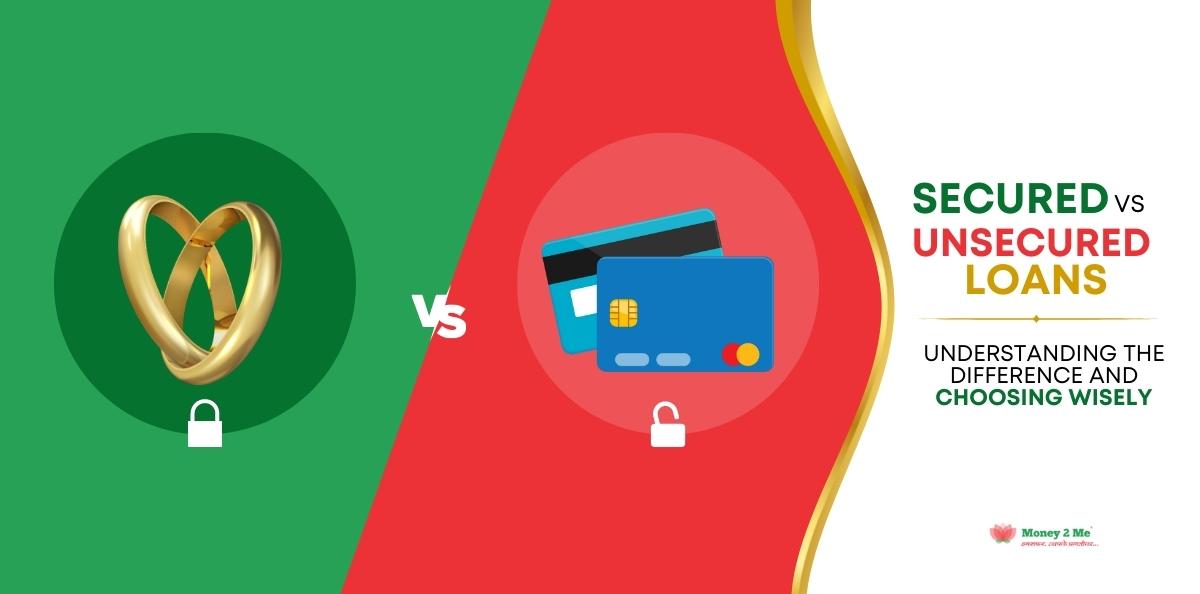Date:12/01/2023
The two common types of loans are secured and Unsecured loans. When it comes to borrowing money, understanding the difference between secured and unsecured finance is important.
By exploring the differences between these two types we’ll help you make an informed decision.
Let’s Start with understanding secure finance in detail.
What are Secured Loans or we can also say collateral Loans?
Secured loans meaning is, they require any property, vehicle, or another valuable asset to pledge as collateral. They are also called secured personal loans. Lenders require collateral to minimize the risk of lending money. By using collateral, lenders have a way to recover their funds if the borrower fails to repay the amount.
Advantages and features of collateral Borrowings:
- Higher credit Amounts: Since lenders have collateral to rely on, they typically offer higher borrowing limits.
- Lower Interest Rates: Collateral reduces the risk for lenders, resulting in lower interest rates compared to unsecured debts.
- Easier Approval: They may be easier to obtain, especially for individuals with less-than-perfect credit histories.
Let’s see a few examples of Collateral loans:
- Mortgage: Homebuyers often secure a mortgage using their property as collateral. Gold loans are a great example of mortgages. They include pledging your gold jewelry, ornaments, etc. as collateral.
- Auto finance: When purchasing a vehicle, borrowers can secure debt with the car as collateral.
- Secured personal finance with collateral: Some Non-banking financial companies offer personal loans that require collateral, such as a savings account or a certificate of deposit (CD).
Unsecured finance is also known as signature loans.
These finances do not require collateral. They are solely based on the borrower’s creditworthiness and income. Lenders assess the borrower’s ability to repay the amount borrowed with interest on a timely basis. Based on their financial history, credit score, and income level.
Advantages & features of Unsecured debts / Signature loans:
- No Collateral Required: They do not put your assets at risk since no collateral is needed.
- Competitive Interest Rates: They typically have higher interest rates compared to mortgaging, they can still be competitive depending on the borrower’s creditworthiness and the current market conditions. With a good credit score and a strong financial profile, borrowers may be able to secure good interest rates on unsecured debts.
- Building Credit History: Successfully repaying can contribute positively to building or improving one’s credit history. Timely payments and responsible borrowing behavior can help establish a solid credit profile, and help maintain the cibil score for one. which can lead to better options for borrowing in terms and eligibility for future credit opportunities.
Let’s understand with examples:
- Personal: These are typically used for personal expenses and don’t require collateral. Personal loan rate of interest ROI can be high.
- Credit cards: Credit cards allow users to borrow money without collateral, paying it back over time.
- Student Finance: Educational finance options often fall under the category of unsecured financing options, helping students finance their education.
Choosing the Right money borrowing Option:
The choice depends on your individual circumstances and needs. Consider the following factors to make an informed decision and save extra costs:
- Creditworthiness: If you have a low credit score or limited credit history, a secured mortgage may be more accessible.
- Higher Value: If you require a large sum of money, secured financing might be a better option due to higher borrowing limits.
- Rate of Interest: Consider the Interest rates while making the decisions. Since secured finance options provide comparatively low rates of interest than unsecured ones.
Unsecured and secured financing options, each have their advantages and benefits. Secured ones provide higher borrowing limits and lower interest rates but require collateral.
On the other hand, unsecured financial options offer flexibility and convenience but typically come with higher interest rates.
Assess your financial situation and needs to determine which one can be the best financial solution for your needs. Remember to compare terms and interest rates from various lenders to ensure you secure the most favorable options possible.

